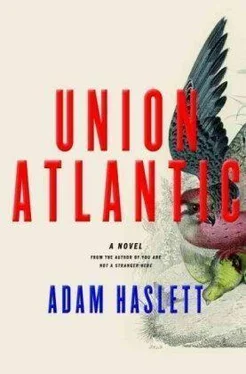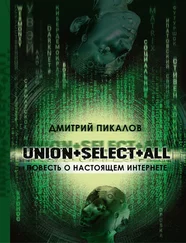“Did we?”
She considered him for a moment and then reluctantly pushed the dogs’ heads back into the house.
“Yes, I suppose we did,” she said. “I guess you’ll have to come in.”
She pulled the door open and stood aside. As soon as Nate entered, the Doberman leapt up, planting his front paws on Nate’s chest and pinning him to the wall. He bared his teeth and began barking. A big, slobbering mastiff stood behind him growling.
“Stop being so paranoid, Wilkie!” the woman yelled. “He’s got nothing to do with Elijah Muhammad. Now just come away!” she scolded, swatting the dog’s head with a dish towel. The attacker pressed against Nate for a moment longer, the whites of his eyes bright in the dark pointed head. Reluctantly, he stepped off, joining the other one, the two of them standing either side of their owner like henchmen guarding passage to the rest of the house.
The kitchen looked like a set from The Grapes of Wrath , the wooden countertops warped and stained, the sink streaked with rust, the claw-foot stove losing its white enamel. The refrigerator appeared to be the only modern appliance, and even it was a pretty busted piece of merchandise. Yet this wasn’t poverty. That didn’t describe it. It was something else. Something Nate couldn’t place.
“Is this a bad time?” he asked, hopefully. “I could come back another day?”
“No,” she said. “It’s as good a time as any. I remember your call now. You’re the one trying to make up for lost time.”
“Yeah. AP history.”
Something seemed to catch her eye on the red-and-white speckle of the linoleum floor; her hands came to rest in the stretched pockets of her cardigan. For a moment there was complete silence.
“I don’t do this much anymore,” she said in a reflective tone, as if the commotion with the dogs had never happened and she were alone in the room, making an observation aloud to herself. “Tutoring, I mean.”
Nate didn’t know what to say. It seemed a private moment. Already, despite her surliness, he feared she’d be disappointed if he left.
“Ms. Cartwright — she mentioned you used to teach at the high school?”
The woman nodded, emerging from her inward turn.
As he picked up his backpack and moved toward the center of the room, the Doberman began growling again.
“Would you like some water?” she asked. “Or perhaps an Orangina?”
“Water’s fine.”
She moved to the sink, filled a pewter tankard, and handed it to him. It looked like something a knight might drink from.
“Well,” she said, “I suppose we ought to get started.”
HE’D IMAGINED a few preliminary questions. About what they had covered in class and what he had missed. But there was none of that. She had been reading about the law of property recently, she said, and this led her to the subject of taxation.
Perched on the edge of the couch, she folded her hands on her lap and stared fixedly into the ashes of the fireplace. After a moment of silence, she coughed slightly and said, “It’s customary for students to take notes.”
“Right,” he said, reaching into his bag for pen and paper, “sure.”
“The Sixteenth Amendment is generally neglected,” she began. “But not in this household.”
With this she commenced an uninterrupted half hour on the adoption of the federal income tax, and the long road to the passage of this general levy on corporations and the wealthy, an idea championed by the Populists and the Socialists and the Democrats under Bryan, shot down by the Supreme Court, agitated for in one campaign after the next, until finally the Republican progressives took it up as the answer to deficits and the tariff mess. Taft, a president who’d failed even to register on Nate’s syllabus, was savaged by Ms. Graves as a generally ponderous and ineffectual man.
“But it should not be forgot,” she said, “that it was he, who in 1909, stood before Congress and proposed an amendment to the Constitution allowing the government to collect the money.”
From an ancient wingback chair losing feathers through the frayed fabric of its cushion, Nate took in the remarkable state of the room. Every surface from the side tables to the mantelpiece and a good portion of the floor was covered in paper: journals, newspapers, magazines, manila folders overflowing with yellowed documents, the piles adorned with everything from coffee mugs to used plates to stray articles of clothing — red wool gloves, a knitted scarf. And everywhere he looked, books: hardbacks, paperbacks, reference volumes, ancient leather-bound spines with peeling gold lettering, atlases, books of art and photography, biographies, novels, histories, some splayed open, others shut over smaller volumes, the overstuffed bookcases themselves standing against the walls like sagging monuments to some bygone age of order, entirely insufficient now to contain this sea of printed matter.
“‘An excise tax on the privilege of doing business as an artificial entity.’ That’s what Taft called the corporation tax.” She quoted from a tome open on the coffee table in front of her. “It took another four years before enough states ratified the measure and a bill from Congress could be sent to Wilson. But there it was, the principle established: for the privilege of earning money in this, the people’s system, you, the wealthy, will pay.
“Now,” she said, warming to her point, “move forward half a century. It’s 1964. The Republicans are in disarray, a party in the wilderness, without the White House, Congress, or the Court. The Civil Rights Act has just been passed. And along comes a man named Barry Goldwater. And he’s got an idea: make government the enemy.”
Almost as remarkable as the sheer quantity of stuff was how completely oblivious to it Ms. Graves appeared to be. She’d made no comment about the condition of the place as she’d led Nate in, letting him clear his own space to sit. It seemed that as far as she was concerned nothing was amiss. And yet, for all the mess she lived in and all her rambling, she didn’t strike him as incoherent. In fact, Nate had never heard anyone speak with such conviction, except perhaps his father. Certainly none of his teachers. This was history, after all. And yet she spoke as if she were waging a rhetorical insurgency against the enemies of civilization.
“And look at us now,” she continued. “Look at how ingeniously they have coded our politics. Using the same line of attack on our own sovereign authority to suit all their other ends. Of course, over time one begins to imagine connections between the darker forces. But then you say to yourself, No, Charlotte. You’re dramatizing, you’re giving in to conspiracy. You’re satisfying some desire to moralize because, let’s be honest, you’re nothing but a stack of Eastern prejudices. But then you pick up this”—she scanned the books at her feet, spotted the one she wanted, and opened to an earmarked page—“and you think, well maybe so. But just listen to how they put it. Here’s Lee Atwater — you’ve probably never heard of him — explaining how it worked. ‘You start out,’ he says, ‘in 1954 by saying, “Nigger, nigger, nigger!” By 1968 you can’t say “nigger”—that hurts you. Backfires. So you say stuff like forced busing, states’ rights, and all that stuff. You’re getting so abstract now that you’re talking about cutting taxes , and all these things you’re talking about are totally economic things and a by-product of them is that blacks get hurt worse than whites.’
“That’s what he says,” she insisted, clapping the book shut. “And so then you think, I’m not mad. Not at all. Taxes are about race. Like everything else. As if sometime in the sixties the public square in our mind changed colors. From imaginary white to imaginary black. And we’ve been running from it ever since. As if anything you couldn’t fence in or nail to your house were the equivalent of the public pool menaced by the dark and the poor. But the public pool’s not in your backyard, you say. It’s nowhere close. True. But it’s in my country. Am I not allowed a patriotism of ideals? Is that what we’ve come to?”
Читать дальше












